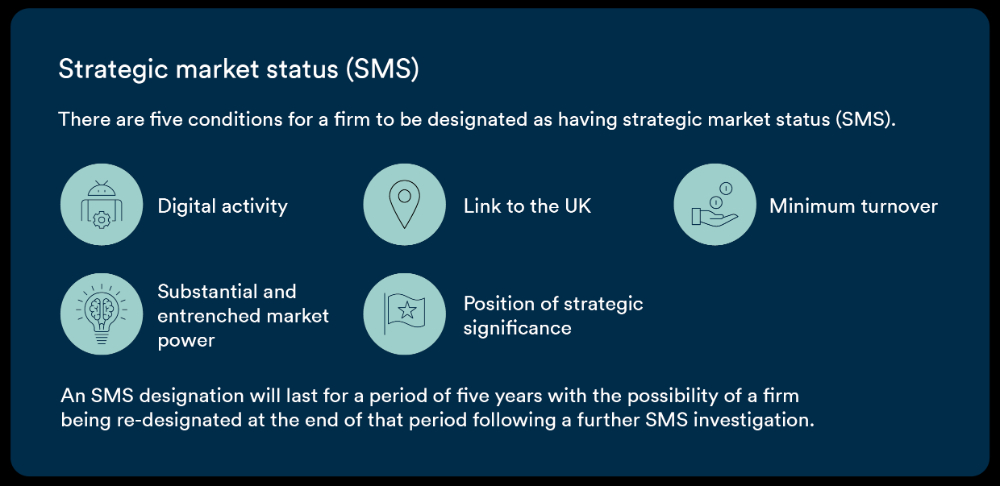In this first article of our Spotlight series on the DMCC Act, we take a closer look at how firms will be designated as having 'strategic market status' (SMS).
A firm may be designated as having SMS in respect to a particular digital activity with a link to the UK where the firm has substantial and entrenched market power and a position of strategic significance in respect of that activity. The firm must also meet certain minimum turnover thresholds. An SMS designation will last for a period of five years with the possibility of a firm being re-designated at the end of that period following a further SMS investigation. We expect the first of these SMS investigations to start towards the end of this year when the new regime comes into force.
This focus on larger firms was first recommended by the Furman Report in 2019 which proposed a new regulatory regime for firms with market power over a gateway or bottleneck in a digital market, where they control market access. The report warned that the regime needed to be carefully designed to avoid burdens on smaller companies. This is now broadly reflected in the requirements for SMS designation in the DMCC Act, as well as the CMA's accompanying draft guidance (currently under consultation).

Digital activity
Firms are designated as having SMS in respect of a 'digital activity' which is defined as the provision of a service by means of the internet or digital content such as software, music, computer games or apps. The regime also captures any other activity carried out for the purposes of those activities. The definition applies even if the services or digital content is provided for free.
In some cases, a firm may carry out more than one digital activity for which it has SMS. The legislation enables the CMA to group these together as a single digital activity where they have substantially the same or similar purposes, or where they can be carried out in combination to fulfil a specific purpose (section 3(3) of the DMCC Act). The CMA will decide its approach on the facts of each case, considering customer needs or preferences alongside the technical complementarity of the activities.
It seems likely that the CMA will seek to group activities where possible to streamline the number of SMS investigations required, and also potentially to make it easier to make findings of SMS (for example, it may be easier to make findings of market power in respect of a number of activities together than findings in respect of each activity separately). This type of approach may also be of some benefit to the firms who are designated with SMS as they may be able to achieve a more joined-up approach to compliance under the regime.
Link to UK
The DMCC Act provides that the digital activity must have a link to the UK. This does not require that the firm is based in the UK, instead it is sufficient that either: (a) the digital activity has a significant number of UK users; (b) the firm carries out business in the UK in relation to the digital activity; or (c) the activity is likely to have "an immediate, substantial and foreseeable effect on trade" in the UK. This is likely to be a low hurdle to overcome given the wide discretion afforded to the CMA. For example, there is no quantitative threshold for a "significant number" of UK users which instead will be context specific.
Substantial and entrenched market power
One of the more substantive requirements is that an SMS firm must have substantial and entrenched market power. This is not defined in the DMCC Act which only specifies that the CMA must carry out a forward-looking assessment for a period of at least five years, taking into account any expected or foreseeable developments that may affect the firm's conduct in respect of the digital activity if the firm was not to be designated.
The CMA emphasises that it considers substantial and entrenched market power to be a distinct legal concept from that of 'dominance' under the Chapter II Competition Act regime. It states that 'substantial' refers to the extent of market power, while 'entrenched' is intended to ensure that the market power is not transient. For the former, the CMA provides no indication as to the 'extent' of market power required to qualify as 'substantial' (or how this might differ from the threshold for dominance). For the latter, the guidance sets a high threshold for proving that existing substantial market power is transient (i.e. requiring clear and convincing evidence that relevant developments will be likely to dissipate the firm's market power).
Do you need to define the market to assess market power?
The CMA indicates that its assessment of 'substantial and entrenched' market power will focus on the competitive constraints applying to a firm in respect of a digital activity including, for example, evidence of substitutability, competitive rivalry and barriers to entry and expansion. Notably, the CMA intends to do this without undertaking the formal exercise of market definition that you might ordinarily expect in assessments of market power for the purposes of competition law. This is not entirely surprising given that market definition has long faced criticism for "drawing arbitrary bright lines" about which products should be included or excluded in a relevant market (as the CMA itself acknowledges in the guidance).
This exercise can be particularly difficult in digital markets which often involve highly innovative industries, network effects, multi-sided markets and/or digital "ecosystems" such as those built around mobile operating systems. The traditional methods for market definition (such as the SSNIP test) also do not easily apply where products are offered free of charge and firms compete on parameters other than price.
The competition authorities continue to grapple with market definition in these markets in competition cases, see for example the 2024 EU Commission Notice which addresses market definition in digital markets albeit with greater focus on competitive constraints. However, the CMA appears to be adopting a more flexible approach for this new digital markets competition regime moving away from formal market definition altogether. This is a trend we may continue to see as, for example, the CMA has already built in more flexibility to look at broader competitive considerations in its updated merger assessment guidelines (published in 2021) which reflect the common practice in most recent merger cases to address market definition without making any final conclusions on a "bright-line market definition" (paragraphs 9.3-9.5).
Whilst recognising the CMA's motivation of baking in more flexibility to its approach to assessing market power under this new regime, it remains to be seen whether the CMA can coherently assess a firm's market power without some consideration of the relevant market. Whilst many, including economists, seek to avoid drawing potentially artificial boundaries, it has long been considered that some assessment of the relevant market is a fundamental to a sound competitive analysis. In this new regime, the CMA is likely to call upon its experience in market studies under the Enterprise Act 2002. This is one area of its existing practice where it has looked at competition concerns without the need to consider market definition (for example the CMA's market studies into online platforms and digital advertising and mobile ecosystems).
Position of strategic significance
The other more substantive requirement for a firm to be designated with SMS is that it must have a position of strategic significance in respect of the digital activity. This will be satisfied if the firm fulfils one of four conditions set out in the DMCC Act in respect of the digital activity: (1) the firm has achieved significant scale or size; (2) the activity is used by a significant number of other firms in carrying out their business; (3) the firm's position would enable it to extend its market power to a range of other activities; or (4) the firm's position allows it to determine or substantially influence the behaviour of other firms.
As with the other requirements, there is no quantitative threshold for these conditions which can draw upon a range of relevant evidence. For example, the firm's size and scale can be measured by a wide range of metrics such as number of users, time spent or frequency of use, the amount of data or the revenue generated.
Regarding the issue of extending a firm's market power, the CMA makes clear that the assessment relates to the firm's ability to leverage its position rather than an assessment of its current or future incentives to do so. Evidence of this could include the fact that the firm controls access to an important product or service for other firms to compete in another area, has access to a rich dataset or has previously extended its market power into new areas.
In relation to firms who can determine or substantially influence the behaviour of others, this concerns situations where firms have a major role in standard setting, regulatory frameworks or where the firm operates a platform for which it performs content moderation or a curation role.
Minimum turnover
On top of the other requirements, firms must also meet the turnover thresholds which limit the regime to the very largest firms. The firm, or its group, must have global turnover of more than £25 billion or UK turnover of more than £1 billion for the relevant 12-month period. Note that for the purposes of these thresholds, all turnover, including that derived from non-digital activities, will be included. Further guidance on the estimation of turnover is expected by regulations of the Secretary of State under Section 8 of the DMCC Act which would be expected in the Autumn of this year at the earliest.
Conclusion
It is clear that carrying out an assessment of whether a firm has SMS will not be straightforward, particularly within the nine-month statutory deadline faced by the CMA. However, the CMA is likely to have a head start as its first few SMS investigations are expected to focus on those firms with which it is familiar from recent or ongoing Competition Act or Enterprise Act investigations. Indeed, the CMA's guidance expressly states that it may rely on evidence and analysis from other cases, including market studies, or other cases under its digital markets functions. There will also be early opportunities for third parties to make submissions, with the CMA publishing an invitation to comment at the very outset of an SMS investigation, as well as at the usual later stage of its proposed decision. The CMA has called out that it is interested in input from "small and challenger businesses and consumer groups" in addition to larger firms (paragraph 2.82, CMA guidance).
Given the complexity of the exercise at hand, it is not anticipated that there will be more than a handful of initial SMS investigations at least initially, and those which are carried out are very likely to focus on the largest technology firms. In our next article of this Spotlight series, we will consider what new rules SMS firms will face once designated.
The content of this article is intended to provide a general guide to the subject matter. Specialist advice should be sought about your specific circumstances.
We operate a free-to-view policy, asking only that you register in order to read all of our content. Please login or register to view the rest of this article.


